The new year brought a seismic shift to the sale of beer in Colorado.
On Jan. 1, grocery stores and convenience stores started selling full-strength beer, instead of the 3.2 percent “near beer” they’ve been limited to peddling for decades.
Full-strength beer previously had been available only in liquor stores, with limited exceptions. Wine and hard liquor continue to essentially be available only in liquor stores.
The change is part of a broader overhaul that state lawmakers approved in 2016, updating liquor laws that dated to the end of Prohibition.
The bill originally contained strict regulations for implementation, including limited shelf space at grocery and convenience stores, 1,500-foot buffers between existing liquor stores and new beer sellers, and a continuation of a policy that only those 21 and up can handle alcohol. All of those regulations ultimately were altered or dropped prior to the Jan. 1 implementation, however.
Other changes that went into effect Jan. 1 allow liquor stores to increase the amount of food they can carry, as long as it remains less than 20 percent of their revenue. And individuals now only need to be 18 to sell alcohol, down from 21 (which remains the drinking age).
Last week, BusinessDen spoke with five liquor store owners in Denver about the changes. Responses have been condensed and edited for clarity.
The Wine Seller and Spirits Too
600 E. 6th Ave. (Speer)
“It’s going to affect our business. I don’t know how much — this hasn’t ever been the law, so there’s really no predicting.
Every single liquor license in Colorado up until now, you could only hold one liquor license. Which means every one of these little liquor stores are individually owned, period. No corporations. Now you’ve taken a big, huge bite out of every single individual liquor seller and handed it over to the corporations who don’t keep the money local, who don’t contribute to their communities, and I don’t think it’s fair.
I just don’t know how this law is going to shake out. For the first time, 18-year-olds can sell alcohol — to me, that’s offensive. First off, you can’t ask an 18-year-old, “How does this taste?” Technically, they shouldn’t be able to give you that answer.
As the little mom-and-pop stores start closing, so goes small craft brewers. The beers are our quicker sellers — they pay for some other stuff to stay on the shelves longer. The less beer we sell, the less time we have to sell everything else.” – Lisa Von Feldt
HJM Wine & Spirits
2016 W. 32nd Ave. (Highland)
“It’s going to affect a lot of small business owners. We can’t compete with King Soopers and Safeway. They can afford to buy hundreds of cases, because they’re a corporation. I can’t afford that. The law isn’t fair. I heard 300 small businesses in Colorado are going to be closed.
I’m trying to adjust by having snacks and cigarettes, but I have to watch it. It can only be 20 percent of my sales, which is a small portion.” – Hanna Weldeyohannes
Capitol Hill Liquors
1032 E. 9th Ave. (Capitol Hill)
“It’ll affect our business tremendously. Over 60 percent of our revenue is from beer sales.
(Across Corona Street is) the first public school built in Denver. From (the school’s) door to (King Sooper’s) door, it’s not even 400 feet. The old law was 500. If you go by the old variances, that school is way too close for them to have alcohol. If you go by the bill passed originally, we’re so close that King Soopers should have bought us out before they could attain the beer. But because of the lobbying of Coors mostly and some other companies, they gave this specific King Soopers a variance.
As salesmen from Coors have told me, they’re going to be buying 1,000-case deals. They have a loading dock and a warehouse, so they get warehouse-drop price, meaning they’ll pay anywhere from 30 to 50 percent less than what we pay.
They’re saying we’re supposed to survive on the wine and the hard alcohol, but that doesn’t make up the percentage of beer sales we’re going to lose to them. We’re not going to add snacks because of the school across the street — we try to keep the young kids out of here.
We have a strong customer base, but we’ve heard a lot of people say that one-stop shopping is easier for them. So that hurts us.” – George Gatchis
Skyline Liquors
2865 Colorado Blvd. (Skyland)
“I think we’ll lose about 20 to 30 percent of our sales. It’s not fair, but we have no choice. I don’t want grocery stores selling beer, but they said they want it, so what can I say? It’s the law, so I have to accept it. I’m not happy though. I will not be hiring anyone under 21.” – Hae Dung Kim
Argonaut Wine & Liquor
760 E. Colfax Ave. (Capitol Hill)
“I think the results remain to be seen. It’s not something we would have liked to have seen happen, but it’s a compromise that we reached in 2016 with the grocery stores. We’d always prefer to see alcohol in an over-21, controlled environment, which is what they did at the end of Prohibition. That’s why grocery stores didn’t have it in Colorado.
Not as much of our revenue comes from beer as you’d see at smaller stores — our beer sales are probably 20 percent. So it’s more of a dramatic impact on smaller stores, which is why they say that maybe 300 stores will go out of business in the next two years because of this change. But I was involved in the legislation in 2016 and the compromise bill, and this is what we agreed to. I think everything will settle in over the next year or so, and we’ll see where it goes.
I’m not planning on hiring anyone under 21. We’ve had prepackaged foods that have a long shelf life since July 2016, but I’m not in the grocery business and I don’t know anything about the grocery business, but if it’s legal and it makes my customers happy, I’m all for it.” – Ron Vaughn
Locations for the five Denver liquor stores
The new year brought a seismic shift to the sale of beer in Colorado.
On Jan. 1, grocery stores and convenience stores started selling full-strength beer, instead of the 3.2 percent “near beer” they’ve been limited to peddling for decades.
Full-strength beer previously had been available only in liquor stores, with limited exceptions. Wine and hard liquor continue to essentially be available only in liquor stores.
The change is part of a broader overhaul that state lawmakers approved in 2016, updating liquor laws that dated to the end of Prohibition.
The bill originally contained strict regulations for implementation, including limited shelf space at grocery and convenience stores, 1,500-foot buffers between existing liquor stores and new beer sellers, and a continuation of a policy that only those 21 and up can handle alcohol. All of those regulations ultimately were altered or dropped prior to the Jan. 1 implementation, however.
Other changes that went into effect Jan. 1 allow liquor stores to increase the amount of food they can carry, as long as it remains less than 20 percent of their revenue. And individuals now only need to be 18 to sell alcohol, down from 21 (which remains the drinking age).
Last week, BusinessDen spoke with five liquor store owners in Denver about the changes. Responses have been condensed and edited for clarity.
The Wine Seller and Spirits Too
600 E. 6th Ave. (Speer)
“It’s going to affect our business. I don’t know how much — this hasn’t ever been the law, so there’s really no predicting.
Every single liquor license in Colorado up until now, you could only hold one liquor license. Which means every one of these little liquor stores are individually owned, period. No corporations. Now you’ve taken a big, huge bite out of every single individual liquor seller and handed it over to the corporations who don’t keep the money local, who don’t contribute to their communities, and I don’t think it’s fair.
I just don’t know how this law is going to shake out. For the first time, 18-year-olds can sell alcohol — to me, that’s offensive. First off, you can’t ask an 18-year-old, “How does this taste?” Technically, they shouldn’t be able to give you that answer.
As the little mom-and-pop stores start closing, so goes small craft brewers. The beers are our quicker sellers — they pay for some other stuff to stay on the shelves longer. The less beer we sell, the less time we have to sell everything else.” – Lisa Von Feldt
HJM Wine & Spirits
2016 W. 32nd Ave. (Highland)
“It’s going to affect a lot of small business owners. We can’t compete with King Soopers and Safeway. They can afford to buy hundreds of cases, because they’re a corporation. I can’t afford that. The law isn’t fair. I heard 300 small businesses in Colorado are going to be closed.
I’m trying to adjust by having snacks and cigarettes, but I have to watch it. It can only be 20 percent of my sales, which is a small portion.” – Hanna Weldeyohannes
Capitol Hill Liquors
1032 E. 9th Ave. (Capitol Hill)
“It’ll affect our business tremendously. Over 60 percent of our revenue is from beer sales.
(Across Corona Street is) the first public school built in Denver. From (the school’s) door to (King Sooper’s) door, it’s not even 400 feet. The old law was 500. If you go by the old variances, that school is way too close for them to have alcohol. If you go by the bill passed originally, we’re so close that King Soopers should have bought us out before they could attain the beer. But because of the lobbying of Coors mostly and some other companies, they gave this specific King Soopers a variance.
As salesmen from Coors have told me, they’re going to be buying 1,000-case deals. They have a loading dock and a warehouse, so they get warehouse-drop price, meaning they’ll pay anywhere from 30 to 50 percent less than what we pay.
They’re saying we’re supposed to survive on the wine and the hard alcohol, but that doesn’t make up the percentage of beer sales we’re going to lose to them. We’re not going to add snacks because of the school across the street — we try to keep the young kids out of here.
We have a strong customer base, but we’ve heard a lot of people say that one-stop shopping is easier for them. So that hurts us.” – George Gatchis
Skyline Liquors
2865 Colorado Blvd. (Skyland)
“I think we’ll lose about 20 to 30 percent of our sales. It’s not fair, but we have no choice. I don’t want grocery stores selling beer, but they said they want it, so what can I say? It’s the law, so I have to accept it. I’m not happy though. I will not be hiring anyone under 21.” – Hae Dung Kim
Argonaut Wine & Liquor
760 E. Colfax Ave. (Capitol Hill)
“I think the results remain to be seen. It’s not something we would have liked to have seen happen, but it’s a compromise that we reached in 2016 with the grocery stores. We’d always prefer to see alcohol in an over-21, controlled environment, which is what they did at the end of Prohibition. That’s why grocery stores didn’t have it in Colorado.
Not as much of our revenue comes from beer as you’d see at smaller stores — our beer sales are probably 20 percent. So it’s more of a dramatic impact on smaller stores, which is why they say that maybe 300 stores will go out of business in the next two years because of this change. But I was involved in the legislation in 2016 and the compromise bill, and this is what we agreed to. I think everything will settle in over the next year or so, and we’ll see where it goes.
I’m not planning on hiring anyone under 21. We’ve had prepackaged foods that have a long shelf life since July 2016, but I’m not in the grocery business and I don’t know anything about the grocery business, but if it’s legal and it makes my customers happy, I’m all for it.” – Ron Vaughn
Locations for the five Denver liquor stores
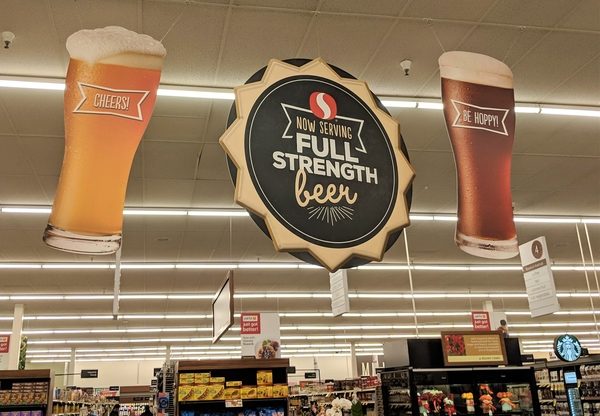
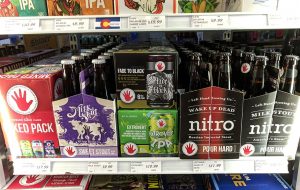
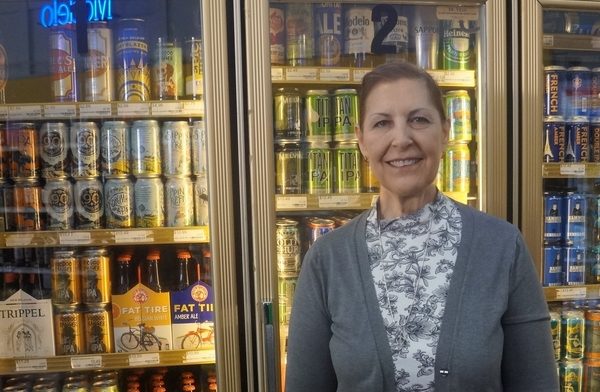
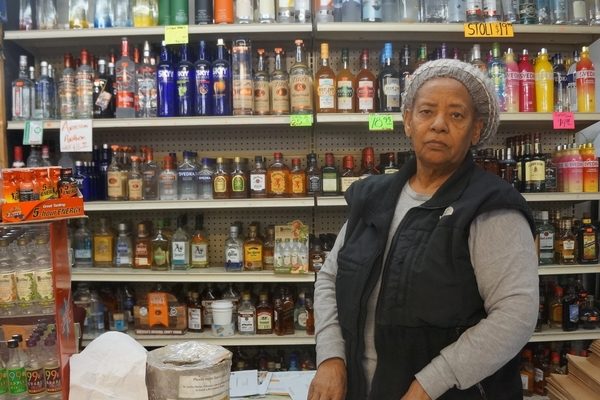
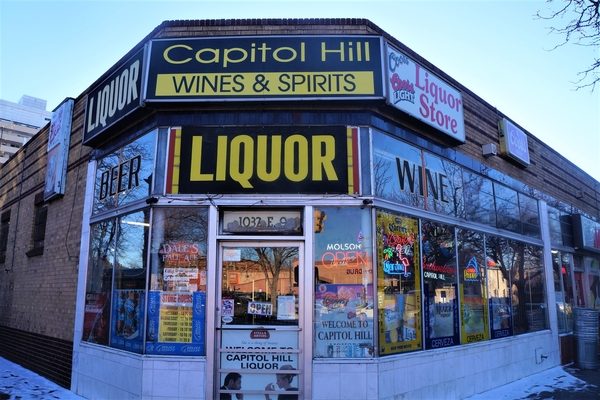
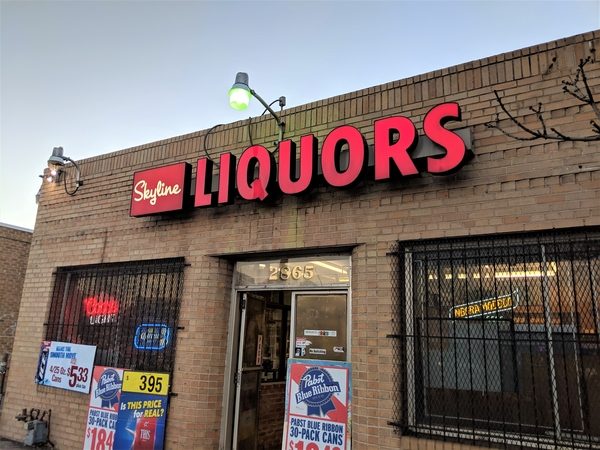


Well, for starters, most of these small businesses charge way too much for their product. If you can’t afford to run a competitive business that doesn’t Google the end consumer, then I have no sympathy; especially for Capitol Hill wine and sprits. That place has insanely marked up pricing.
Here’s one idea of how to stay competitive: research what beers the major grocers sell, and sell different beers. If they provide Avery, go sell renegade. Focus on local and get clever by offering difficult to source imports and out of state beers. Maybe contact the likes of Yeungling and attempt to cooperate with other local stores to sell Yeungling only at small liquor stores. It’s cheap and you would have trouble keeping it stocked. Maybe focus on a popular loss leader to get more attention from clients, who may then but an extra shooter. Contact local distillers who self distribute and attempt to market those products at a reasonable rate.
These are but a few ideas and they might not work, but you need to get creative if you want to remain competitive. The market is saturated with beer, focus on what’s popular for each season and stock those. Also, stop selling 6 packs for $11 .99 and if you can’t then you don’t deserve to compete
Gouge*, not Google.